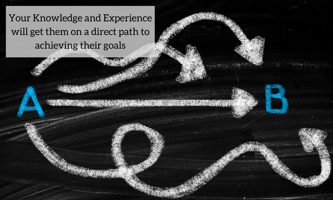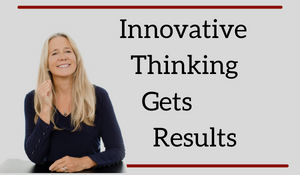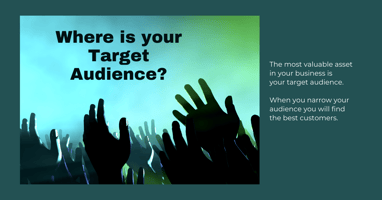To stand out from your competition and to create successful marketing campaigns, you must create...
What Role Does Personality Play In Your Career Choice?
Your personality type can make it easier to work in some occupations than others.Personality tests can be useful for a number of reasons. These tests can help you learn more about yourself and better understand both your strengths and weaknesses. And while all personality tests are different, learning that you might be high on a specific trait can help you gain greater insight into your own behavioral patterns.

Why is Personality Type So Important for Your Career?
There are benefits that come with choosing your career based on your personality traits that can help you be more productive in your role.
Here are a few reasons why it's important to take your personality into account:
-
Job Satisfaction: Your personality plays a significant role in determining the level of satisfaction you experience in your career. When your work aligns with your natural tendencies, interests, and values, you are more likely to enjoy what you do on a daily basis. This can lead to increased happiness and fulfillment in your professional life.
-
Motivation and Engagement: Choosing a career that matches your personality can boost your motivation and engagement. When you are naturally inclined towards the tasks and responsibilities of your job, you are more likely to feel energized and driven to perform well. This can positively impact your overall performance and productivity.
-
Natural Aptitude: Your personality traits are often linked to certain skills and talents. By choosing a career that aligns with your natural aptitudes, you can leverage your strengths and perform at your best. This can enhance your professional growth and increase your chances of success in your chosen field.
-
Work-Life Balance: When your career aligns with your personality, it becomes easier to strike a balance between work and personal life. You are more likely to enjoy your work, which can lead to a healthier overall well-being. This balance can reduce stress levels and contribute to a higher quality of life.
-
Long-Term Commitment: When you choose a career that aligns with your personality, you are more likely to stay committed in the long run. A mismatch between your personality and career can lead to dissatisfaction and a higher likelihood of job hopping. By considering your personality, you increase the chances of finding a fulfilling career path that you are willing to invest in for the long term.
Worried you're in the wrong career? Here are four signs of a major personality / career mismatch:
-
Boredom – It’s simple. The field you are in just does not interest you anymore. It might have grabbed your attention 5 years ago, but now that you are “in it” you realize it's not really what you want to do. Boredom is one of the clearest signs that your career doesn’t match your personality. As you push yourself through the motions each day, you will inevitably become more and more disengaged from the work you do.
-
Feeling unfulfilled – When you are working in the wrong career, you slowly find yourself feeling unfulfilled. Meaning you are going through the motions, just doing what needs to be done. Almost robotically. You also realized that what you do everyday does not align with your core values. Core values are funny in that you cannot ignore them for long. They will find ways to manifest themselves in support of more fulfilling alternatives.
-
Stifled by lack of growth opportunity – Humans intrinsically want to grow. This applies to all areas of life, not just career. When an employee starts to feel like there is nowhere to go within the structure of their organization, a feeling of being trapped will set in. Some personality types tolerate this situation better than others.
-
Daydreaming – When you are at work, do you zone out and think about the great things you could be doing instead? Do you find yourself daydreaming about spending more time on your hobbies? If the answer to those questions is yes, then the chances are you’re in a career that doesn’t match your personality. Looking at people’s passion projects is a great tool in helping them find a career that suits their personality, since people tend to choose their hobbies based on their deepest values and not on external factors such as salary or job security.
The Different Personality Types
Most often attributed to Confucius, the saying “Find a job you love, and you will never have to work a day in your life” is easy if your job aligns with your personality.
For example, a very social person might love a job as a salesperson, while a shy person might find that job difficult and even disagreeable. Here is a list of nine different personality types and the jobs best suited for each personality.
The Introvert - a shy person or one who keeps their thought to themselves - tend to work best alone or in small groups. Introverts can be very focused and they have a strong attention to detail because they enjoy concentrating on one task at a time.
The Extrovert - an outgoing or overly expressive person - enjoys working in large groups and often prefers team assignments. They are typically comfortable speaking in public and leading group activities. They are also multitaskers who work best when juggling multiple assignments.
The Organizer - an outgoing, detail-oriented, and practical person. Organizers enjoy the community and conventional structure and order in daily life. They enjoy following standard rules and procedures but like to be involved in groups. Organizers enjoy jobs in which they can gather and manage data. They have a desire to remove clutter, which allows them to enjoy tasks ranging from organizing an office to editing an article.
The Artistic - they like to use their hands as well as their minds. They enjoy being creative and innovative in their job. Artists typically do not enjoy conventional work settings, but instead, prefer to work on their own time with limited supervision and a flexible schedule. They prefer to implement their ideas rather than managing or following the ideas of others.
The Caregiver - a service-oriented person. They enjoy seeing to other peoples’ needs. The caregiver is a “people person,” who enjoys both working alongside others and working for the welfare of others. They are very responsible and reliable and have strong organizational skills.
The Enterpriser - a born leader who enjoys the responsibility of mentoring others and building and maintaining teams of people. Enterprisers often like to see projects through from start to finish, but they also understand how and when to delegate tasks to others. They tend to be very self-confident and ambitious.
The Analyst - enjoys analyzing theories and using their logical reasoning skills. Analysts often enjoy working alone and prefer working on complex problems through to the end. They often hold themselves to high standards and are thus very detail-oriented.
The Idealist - enjoys working to make the world a better place. They work best when working toward a lofty goal with a focus on social progress. Idealists often enjoy working on a team with others.
The Realist - enjoys working with facts and achieving tangible results. They enjoy doing and creating rather than strictly thinking and analyzing. Realists often enjoy working with their hands, using equipment like tools and machinery. Being very practical, realists are often good at remaining calm in difficult situations.
Should you take a personality test to determine what career path to take?
Personality tests can be useful for a number of reasons. These tests can help you learn more about yourself and better understand both your strengths and weaknesses. And while all personality tests are different, learning that you might be high on a specific trait can help you gain greater insight into your own behavioral patterns.
Here is a short list of the popular personality tests.
Truity
Established in 2012, Truity is a popular test that has developed a library of scientifically validated personality tests to help people understand themselves and those around them.
Through their website, users can take a range of tests including;
-
Enneagram (9 personality types)
-
Typefinder (16 personality types)
-
Big Five Assessment
-
Career Profiler
-
Workplace DISC Test
Over 2 million tests are taken on their website every single month.
HIGH5 Test
HIGH5 is the free strengths test that helps people find out what they are naturally good at. If you have ever heard about the StrengthsFinder, this is it.
It is based on the principles of personality psychology and positive psychology. The core premise is that fixing one's weaknesses can help to avoid failure, but to achieve success, happiness, and fulfillment - one needs to maximize their strengths. Therefore, HIGH5 is designed to identify what's strong in people rather than what's weak.
Unlike other assessments, HIGH5 does not assign you to a specific group or type. Instead, it identifies your unique strengths sequence, which is as unique as 1 in 1.86 million. Due to its action orientation and development focus, the assessment is used by professionals in 95% of Fortune 500. It is frequently applied in personal development, team building, coaching, and leadership development.
DiSC
Introduced by Walter Clark in 1940, the DiSC personality profile was designed to measure dominance, influence, steadiness, and conscientiousness.
The questionnaire was created predominantly for organizational use and can be used for leadership and executive development, management training, sales training, conflict management, team building, customer services, communication and job coaching.
The DiSC assessment contains 28 questions, where the participant picks a word that is most like them, and a word that is least like them for each question. The online personality test is designed to be easy to use, easy to administer and to be delivered by anyone.
Prices for this assessment range depending on the type of career tests, the size and type of team it is being applied to and the number of people.
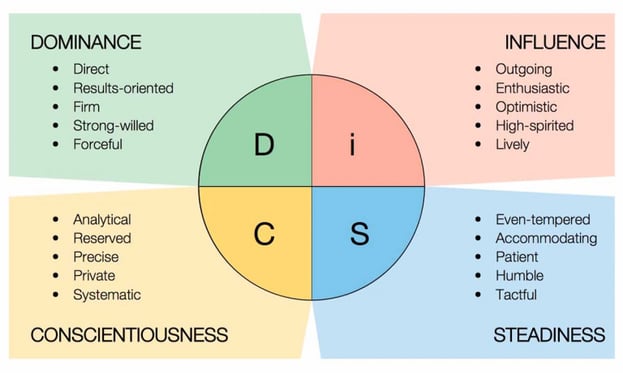
Myers-Briggs Type Indicator
The Myers-Briggs Type Indicator (MBTI) was introduced by Katharine Cook Briggs and her daughter, Isabel Briggs Myers, in the 1940s.
The Myers-Briggs test is based upon an earlier theory that was introduced by Carl Jung - a theory that humans experience the world using four psychological functions: sensation, intuition, feeling and thinking. These functions affect many things, such as one's work style, mode of rejuvenation, strengths, weakness, individual differences, and so on. Later Isabel Myers and Katharine Briggs would format those four psychological functions into sixteen personality types.
The MBTI test measures whether an individual is extroverted or introverted, whether they have a sensing preference or an intuitive preference when it comes to processing information, whether they prefer to make decisions by thinking or feeling and whether they have a judging or perceiving preference about how they do things.
The test results from the questionnaire then place the person onto one of 16 personalities, each has their own strengths and weaknesses, such as the ENJF personality type.
Test takers can use the MBTI for individual development, employee development, team development, team productivity and to increase team effectiveness.
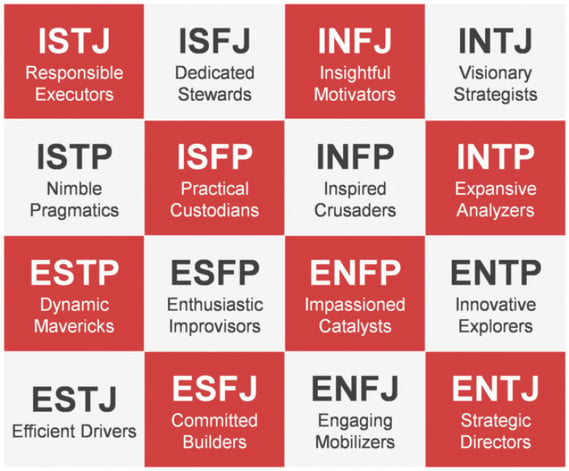
HEXACO Model of Personality Structure Personality Inventory
The HEXACO model was constructed in the year 2000 to assess some of the personality dimensions, and theoretical interpretations, that had been outlined in earlier studies.
The model measures six major personality dimensions, namely: Honesty-Humility, emotionality, extraversion, agreeableness, conscientiousness, openness to experience.
The inventory is comprised of 200 questions for the full-length assessment or 100 questions for the half-length assessment.
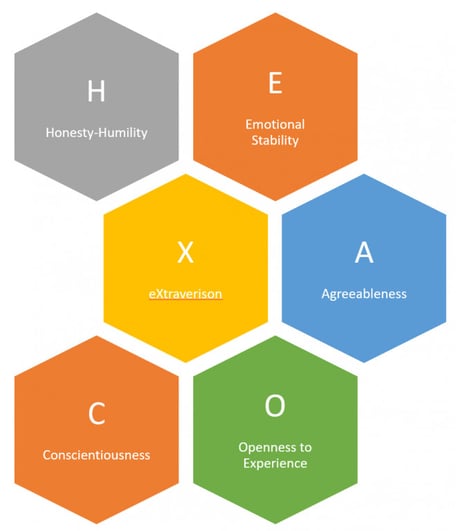
16 Personality Factor Questionnaire
The 16 Personality Factor Questionnaire (16PF) was first published by Cattle, Tatsuoka, and Eber in 1949, however, since then there have been more additions. This questionnaire is based on Allports 4000 proposed personality traits, which Cattle Narrowed down to 171, and then later down to 16, to design the tool.
The questionnaire is designed to measure normal behaviors and can bed used for career development, employees selection, marital help, and counseling; but it does have some clinical reference.
It measures: warmth, reasoning, emotional stability, dominance, liveliness, rule-consciousness, social boldness, sensitivity, vigilance, abstractedness, privateness, apprehension, openness to change, self-reliance, perfectionism, tension.
Is It Time To Change Careers To One That Matches Your Personality?
You might start out in the wrong career, but it is your responsibility to learn from each professional step you take. Don’t be afraid to explore and try new things. In doing so, you will build out a profile of what your ideal career does and does not look like, and put yourself on a better trajectory.
It's never too late to change careers, and it is better to make the switch sooner rather than later.


